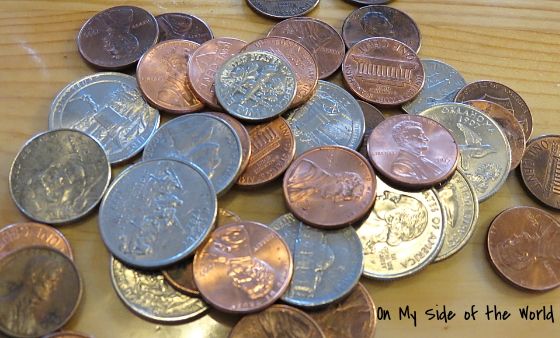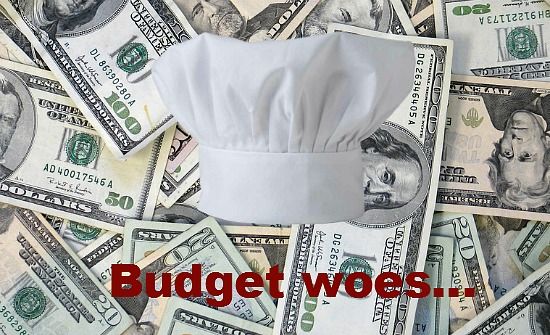Pin It
Have you ever had a moment when you do Google search for ideas on how to lower your grocery budget only to end up biting your nails in frustration when you read how some people feed their families on like $30 a week, and others spend only $200 a month on food for a family of six? Do you second-guess yourself wondering why, no matter how hard you try, you just can't achieve numbers as low as some other frugality ninjas?
The truth is, you cannot use somebody else's finances towards your own family, and it applies to your groceries too. There are many reasons for it. I want to talk about a few today:
Location, location, location. Food is expensive! But in some areas of the country it's even more bank-breaking than in others. The amount of money you spend on food varies from location to location going from a few cents to a very significant amount. For example, the average price of 1qt of whole milk in NY (according to Expatistan) is $2.97. For this price, I can buy a whole gallon and throw in a pint of cream too if I find both on sale. I can definitely stretch my hard-earned dollar much further (Granted, my salary cannot compare to the average income in NY either. But that's a whole other topic...). Proximity to the stores also plays a huge role in creating a budget. Businesses tend to have a competition to lure the most clients in, and if you have plenty of stores close by, you can use it to your advantage by shopping only for loss items. But if your closest store is about 20 minute drive, it will be much harder to find the same nice deals and sales. Again, it all comes back to the location.
Your preferences and needs. Your diet plays a huge role in how you calculate your monthly expenses. One of the best ways to cut on groceries is go meatless a few times a week. With that said, being vegetarian or vegan doesn't always mean that you will spend significantly less. The most important part of our nourishment is to have nutritional balance. If you replace animal products with expensive processed vegan food, you, probably will spend the same if not more. No matter what our preferences are, it's important to have nutrients, carbs, vitamins and minerals in our diet in a good, healthy proportion. Hence, the best way to cut on expenses is to eat whole foods on sale like seasonal fruit and vegetables, dried beans instead of canned, real meat opposed to over processed hot dogs or chicken nuggets. Eating organic will also bump the price ticket but with using less, buying local and cooking at home you can definitely lower that number. Not even mentioning the health benefits...
Another important thing to remember are your needs. I'm talking mostly about health needs. For example, if you have food allergies or intolerances, no matter how hard you try, some things are just going to be more expensive then the others. Again, shopping sales can help some but, more than likely, your budget will be higher than for most people who don't have to face the same issues you do.
Size, gender and age of the family members. I can just see some of you, mothers of teenagers, chuckling out there. We all know that teenage girls usually eat slightly more than a duckling, and boys are just bottomless pits. The size, gender and age of your family's members play a huge roll on how you calculate your expenses. The level of activity can also be a determining factor. A few years ago I read an article about a Polynesian family who had two high-school age sons who played for their local football teams and were drafted by some prestigious colleges. Among other things their Mom mentioned that they go through at least 4 gallons of milk every week trying to keep up with boys' needs and necessary calorie intake. I remember giving an extra long look at my baby boy I was cradling in my arms back then, mentally calculating how many part-time jobs I would need to land by the time he hits high school.
Your own resources and circumstances. One of my most favorite parts of our back yard is our garden. I spend countless hours in there happily digging through piles of dirt and spreading beautiful manure everywhere while constantly working on creative plans on how to lower the amount of weeds that tend to grow overnight and are not scared of anything. But even though it really helps with our expenses over summer, gardening takes time and space that many of us don't have. We can definitely take advantage of buying from farmers or trading help for produce with friends but if you live somewhere in the middle of Manhattan, even these options are very limited. Knowing what is available to you will really help to make the right estimation of what you might need and how much it would cost you monthly. Other circumstances like working long hours can also be a determining factor. I do believe that even if you have to work like crazy, there are many ways to avoid going for fast food (like cooking in bulk once a week or using a slow cooker, to name a few). The previous generations did not have the luxury of food prepared for them, and they were healthier than we are right now. There is something we can learn from them, that's for sure :)
In the end, the most important thing to remember is that even though the quote "much to learn you still have" (in the words of ever-inspiring Yoda)applies to most of us, we need to find what works and stick to it. You and your family is what really matters, and there is no reason to be upset that you cannot go as low as some others if you do your personal best (the last phrase might or might not have been inspired by me braking a promise to myself not to watch too much Olympics :)
What are your thoughts?







